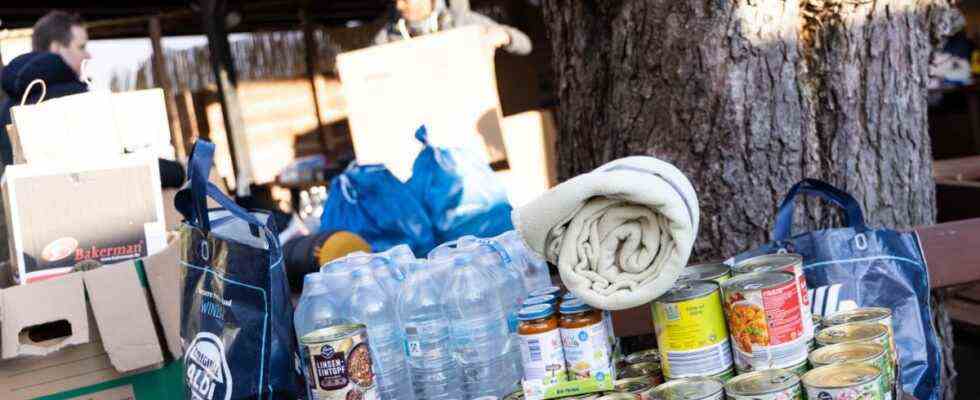At four o’clock on Sunday morning, a convoy with at least five cars and twelve drivers left Fürstenfeldbruck for Lublin in Poland. They loaded clothes, drinking water and medical items such as masks and sanitary towels. Some of the relief supplies are destined for refugees from Ukraine who have meanwhile arrived in Poland. The rest will be taken over by an aid organization in Lublin and brought across the border to Ukraine. Restaurateur Moritz Hickethier and City Councilor Florian Weber (Die Party) spontaneously initiated the private relief effort on Saturday. In the afternoon, more than 300 people brought relief supplies to the collection point in the lower house’s beer garden. About 30 people stayed for sorting and packing, others made themselves available as drivers.
More than 300 people find their way to the collection point for the Ukraine relief supplies.
(Photo: Lukas Barth/lukasbarth.com)
Hickethier works as a restaurateur in the Brucker pub “Unterhaus”, while Weber runs the “Clubhouse” and sits on the city council for the party. On Saturday morning, they spread an appeal to donate relief supplies via social media and the pages of the “Clubhouse”, “Lower House” and the party. The call will be shared and disseminated immediately. The first people bring donations to the beer garden, where the material is sorted and stacked. Hickethier and Weber are supported by friends, acquaintances and colleagues, but primarily by complete strangers. “It was much bigger than we thought before,” says Weber.
Restaurateur Moritz Hickethier (left) and City Councilor Florian Weber (Die Party) spontaneously initiated the private relief effort on Saturday.
(Photo: Lukas Barth/lukasbarth.com)
The private relief effort was started by a Ukrainian colleague who lives in Bruck and works in an inn. When the Russian attack began, she went to the Polish-Ukrainian border to meet her family. However, her father was turned back at the border because the Ukrainian government called up all able-bodied men. She doesn’t like reading her name in the newspaper. She informed Hickethier about the situation and he had the idea of organizing an aid transport. “Because she is on site, she was able to tell us exactly what is currently needed and as quickly as possible,” says Weber. These are, for example, thermal underwear, socks, fleece jackets, boots and sturdy shoes, bottles and canisters with water, heating blankets, compresses, cotton wool, medical gloves, disinfectant wipes and trauma scissors, muesli and energy bars, canned and dry food.
Some of the relief supplies are destined for refugees from Ukraine who have meanwhile arrived in Poland. The rest will be taken over by an aid organization in Lublin and brought across the border.
(Photo: Lukas Barth/lukasbarth.com)
All Saturday afternoon people come to donate and help. “There are still people outside bringing things,” says Weber in the late afternoon. The solidarity is enormous. Hickethier and Weber originally wanted to drive a van, but then more and more cars and drivers came along. Employees of the Brucker vaccination center make themselves available, a woman drives with her mobile home. In the evening, Weber expects at least five to seven vehicles, including some that can be loaded up to a total weight of 3.5 tons. He estimates the distance to be around 1,200 kilometers to Lublin, which is still a good 150 kilometers from the Ukrainian border. Weber hopes that the convoy will arrive there in 13 to 14 hours and that everyone will return safely to Fürstenfeldbruck on Monday.
In the evening it looks like Hickethier and Weber don’t have enough transport capacity for the amount of donated goods. However, Weber assures that all products are used in accordance with their purpose. He has already contacted the Ukrainian Orthodox Church in Munich, which is also bringing relief supplies to the crisis area. In addition, the Edigna association in Puch, which has contacts in the Ukraine, is planning to put together another convoy on Wednesday, says Weber.
On Saturday, more than 30 believers gathered in Puch for a “peace prayer” for Ukraine. There, too, they want to put together an aid transport.
(Photo: Lukas Barth/lukasbarth.com)
More than 30 believers gathered in Puch on Saturday for a “peace prayer” for Ukraine. It took place at the Edigna lime tree. . “We think of the people in Ukraine with great concern and pray to Blessed Edigna for help, blessings and support for Ukraine,” Edigna Kellermann announced the campaign. She is chairwoman of the Edigna association Puch.
A place of pilgrimage is Puch and the Edigna lime tree for members of the Ukrainian Orthodox Church.
(Photo: Lukas Barth/lukasbarth.com)
A special relationship between the district and Ukraine is evident in Puch. Because the fate of the blessed Edigna, who is said to have lived in the lime tree 900 years ago and where her mortal remains are kept, plays an important role in Ukrainian history. That is why Puch is also a place of pilgrimage for members of the Ukrainian Orthodox Church. Among others, the then Ukrainian President Viktor Yushchenko visited the lime tree.

